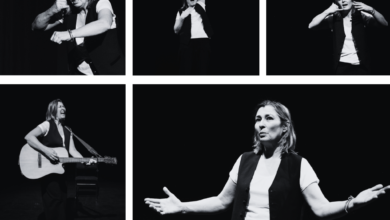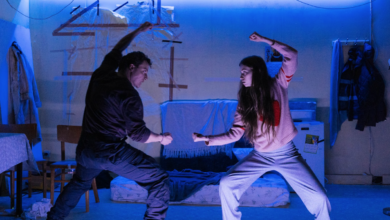Review: Monster’d, Bread & Roses Theatre
A surrealist production told through the lens of a young neurodivergent woman trying to make sense of a world that doesn’t make sense to her.Rating
Good!
Imagine waking up in a world where nothing makes sense; the body that you have is difficult to become acquainted with, and you can’t understand anything or anyone around you. This is the world that Aurelie (Aurelie Burton) wakes up to in Monster’d, a modern take on Mary Shelley’s classic story Frankenstein. Similarly to Frankenstein, the protagonist is created by a scientist, here otherwise known as The Creator (Kate Donnachie). The Creator is shocked and amazed at first as she marvels at her creation, but is all too quick to reject Aurelie, sending her out into an unknown and frightening world with nothing but a copy of the works of Shakespeare.
While Monster’d is an adaptation which stems from Frankenstein, it is told from the perspective of a young neurodivergent girl, exploring how she grows up in a world which she does not understand, and where no one understands her. Aurelie learns how to speak from reading Shakespeare’s writings, and therefore has trouble understanding and communicating with everyone else, as initially she only knows Shakespearean lines. She also speaks with a stammer, making it difficult for her to enunciate words, and while she is quick to understand everyone else, they have trouble understanding her. To really emphasise the world from Aurelie’s perception, everything about Monster’d is portrayed from a quite surreal standpoint.
The programme for the show states that the production is about a young woman and her struggle not just to be heard, but to be understood on her own terms. But these words alone cannot measure up to the surrealist power of the play, which immerses the audience in her perspective to better understand it. Like many surrealist works, Monster’d is bizarre and frankly weird, but it makes sense. The production is laced with dream-like sequences: in one scene, a person dances around Aurelie wearing a dolphin mask; in another, she is speaking with William Shakespeare (Liam Bergin). The characters run about the stage frantically, giving the impression of how truly frightening the world can be for someone who doesn’t know where to go and what to do.
Aurelie’s story is not written in a linear nor a logical fashion because her reality is entirely different from everyone else around her. One of the first lines we hear from her is from Shakespeare’s Hamlet: “To thine own self be true.” This is the very essence of Aurelie’s character, as everyone else around her tries to make her into something that she is not. The script itself is dreamlike and poetic as she is continually thrown into circumstances which try to shape her into an ideal image – but it’s one that doesn’t make sense, and therefore she cannot fit the mould.
Throughout the entire production, the actors, the set design and the lighting have the audience utterly immersed in Aurelie’s dream-like reality. At the very beginning, where Aurelie is created, Ted Walliker’s lighting design mimics the electrical currents in the Creator’s laboratory. The lighting shifts through various colours, enhancing the sheer strangeness and the profound deep emotion of everything. At certain points, the stage is engulfed in darkness, emphasising how scary and lonely this world is for Aurelie.
The surreal style of Monster’d might not be for everyone, but this production nonetheless makes an important call for systemic change for neurodivergent artists, such that they are not only recognised but, through a deeper shift, are allowed to thrive without having to translate themselves in order to be accepted. It portrays this message beautifully.
Directed by: George Richmond-Scott and Paloma Oakenfold
Written by: Paloma Oakenfold
Set and Costume Design: Juliette Demoulin
Lighting Design: Ted Walliker
Sound Design: Oliver Brierley
Movement Director: Rachael Wise
Monster’d plays at The Bread & Roses Theatre until Saturday September 13






